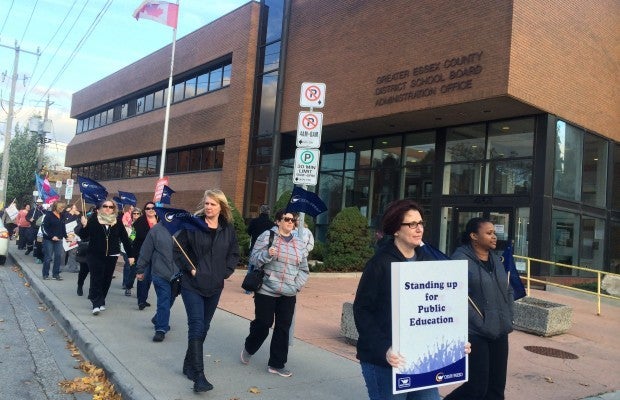Toronto Star
Monday, December 7, 2015
Byline: Michael Robinson Toronto Star
The Toronto public school board’s youngest students are being suspended at a skyrocketing rate that has jumped nearly 50 per cent over the past four years.
The surprising findings, drawn from recent safety reports from the Toronto District School Board (TDSB), show that, while suspension rates overall have gone down, students enrolled in kindergarten to Grade 3 are increasingly being sent home as punishment.
TDSB spokesman Ryan Bird said a principal’s decision to suspend a student is a “last resort,” used only after other remedial efforts have failed.
“The word ‘suspension’ may sound harsh, but this is essentially our version of a timeout, like people do with young kids at home,” he told the Star.
Released annually, the TDSB Caring and Safe Schools Reports contain a comprehensive overview of student suspension and expulsion data logged throughout the school year. In 2014-15, 12 per cent of all suspensions were doled out to primary students. The figure was pegged at 6.7 per cent just three years prior.
The increase in junior and senior kindergarten suspensions in particular, Bird explained, could be the result of the TDSB’s transition to full-day kindergarten, a shift completed last year.
Elementary Teachers of Toronto president John Smith said the report is yet another signal to Queen’s Park that government cutbacks have left teachers ill-equipped to deal with the current classroom climate.
“Educational assistants are vital in special education programming because they provide one-to-one help, yet they have been cut so viciously over the years,” he said.
Without this vital support, teachers face hazards alone in the classroom, Smith warned. “It may seem strange saying it, but 3- or 4-year-olds in kindergarten can be violent to their peers or teachers,” he said. “There have been cases of broken teeth, stabbings with pencils, pregnant teachers who are head-butted.”
Some repeat incidents have worsened to the point the union approached the Ministry of Labour on the grounds of right-to-refuse work legislation. “If you are being bit on the arm every day but provided with protective clothing to wear around your arms and legs, it doesn’t really address the problem,” he said.
This year, TDSB trustees moved to cut 23.5 special education support staff positions. The reduction was one of several cost-saving measures adopted by the board to offset a $16.5-million shortfall in this school year’s funding.
In an emailed statement, Ministry of Education spokesman Gary Wheeler said public school boards receive funding for various initiatives, such as programming for expelled and long-term suspended students.
Alexia Dyer, director of the educator consulting firm SoJust Education, said she believes one solution is to simply scrap suspensions all together.
The Ontario Institute for Studies in Education graduate has worked with various GTA school boards to develop and reshape discipline policies.
“In no way should a child be punished with such a severe consequence for a mistake, even if they had an outburst or pushed someone,” she said. “When a child acts out that way, there is a reason.
“If we are trying to train students to act in a certain way, shaming and isolating them from their classroom community isn’t helpful.”
Dyer suggests schools replace the suspensions with restorative-justice techniques instead. This “talking-it-out” approach, she said, turns incidents into teachable moments that apply to the entire class.
“It is a way to teach students they are a part of my community and how they can ally themselves and work with the individual who is struggling or acting out.”
(c) 2015 Torstar Corporation





